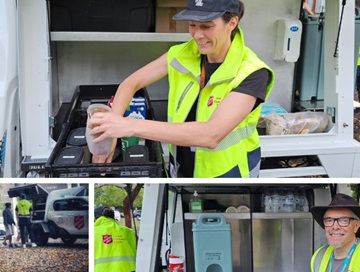If you have started to notice mould build up in your rental, you should act sooner rather than later. While it can be a grey area when it comes to who is responsible for mould - you or property owner - you can be held accountable if the mould break out is a direct result of your actions or lack of.
Before we go into the legalities of who is responsible for mould maintanance and eradicating it throughout the duration of your tenancy, it is important as a tenant to understand what mould is and what causes breakouts to occur wherever you live.
What is mould?
According to the Department of Mines, Industry Regulation and Safety (DMIRS), moulds are fungal organisms that multiply by producing very small spores. When disturbed, these spores are carried in the air and if they land in a place that provides moisture and a food source, they start to grow. Mould can develop on a wide range of surfaces. These can be on, within or underneath walls, ceilings, and other hard and soft surfaces in homes.
Common sources of moisture indoors include roof and gutter leaks, flooding, leaking and burst pipes, unflued gas heaters, and condensation from cooking, showering, and clothes drying.
Mould is more likely to grow in colder weather when air flow through the house is minimal. This can be due to activities like hot showers, cooking hot food, tumble drying clothes or anything that produces steam whilst windows and doors are kept closed.
Quite disturbingly, mould has a number of severe health risks that should be taken seriously. People who inhale, ingest, or have skin contact with the mould spores or particles can experience asthma-like respiratory illnesses, sinus problems, chronic cough, headaches, tiredness, frequent sneezing, rashes, and watery, itchy, red eyes.
What are my obligations as a tenant?
If it has been identified that you have caused the underlying problem that led to mould developing or haven't informed your property manager of an issue with the property that has led to the mould outbreak, you may be responsible for mould damage and may have to compensate the property owner.
Some actions that can cause mould to grow include:
- Not using exhaust fans or opening windows when showering or cooking.
- Not allowing ventilation of a room when drying clothes inside.
- Not drying water spills or wiping up condensation on surfaces.
- Storing large amounts of water-absorbent materials such as books, cardboard boxes and soft furnishings in a damp space.
Sometimes, you may not be able to see the mould, which is why it is important that you and your property manager are taking preventative measures such as:
- Keep your rental as clean and tidy as possible (this is an agreement of your tenancy anyway).
- Immediately advise your property manager of any maintenance or issues that need fixing and ensure they follow through as soon as possible.
- Look for any signs of moisture inside the property, such as water stains, condensation on walls or windows, and damp or rusty odours.
- Advise your property manager of any structural things that may help, such as installing exhaust fans in bathrooms and laundry rooms, or extraction fans over cooktops. If you are to rely on windows for ventilation, ensure they can be secured if left partially open.
- Try allow sunlight into the property as much as possible and ensure there is sufficient air flow.
- Keep all areas and surfaces dry, clean and ventilated.
More information
For more rental advice, visit the advice section for more articles.
.tmb-imgwidgetm.jpeg?sfvrsn=821a559c_1)






.tmb-rcarousel.jpg?sfvrsn=b4b9111_1)


.tmb-rcarousel.jpg?sfvrsn=d38b03f0_1)